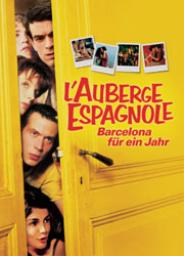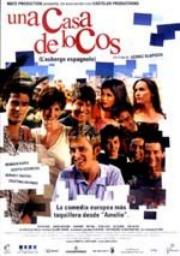/ Home / Barcelona Movie Walks / The Barcelona of Erasmus StudentsPrint version
The Barcelona of Erasmus Students
  |
Synopsis:
Xavier is a 25-year-old Frenchman who is studying Economic Science. A friend of his father’s suggests he take exams to join the Ministry of Economy and Finance but he has to speak Spanish to find a job there. He decides to go to Barcelona to complete the final year of his degree, taking part in the European university exchange programme, Erasmus. After he arrives in Barcelona, he moves into an apartment with seven other European students (an Italian, an English girl, a Dane, a German, a Belgian girl and a Catalan girl). During the year, Xavier undergoes a series of experiences that are like a period of initiation. In spite of the linguistic and cultural difference and the fact that they are away from home, the seven young people get to know and love each other.
Main prizes
L'Académie des Lumières: Best revelation actress (Cécile De France), Best cinematography (Cédric Klapisch), Brisbane International Film Festival: Best director (Cédric Klapisch), César: Best revelation actress (Cécile De France), Étoile d'Or: Best revelation actress (Cécile De France), Karlovy Vary International Film Festival: Best director (Cédric Klapisch), Sydney Film Festival: Best director (Cédric Klapisch), Best Fiction Film (Cédric Klapisch)
|

Did you know that...
• The Erasmus Programme is an exchange initiative of the European Union that enables students from all over Europe to study for part of their degree in another country. The programme gives many students their first opportunity to live abroad and this has made it an extremely popular social and cultural phenomenon among students. • The film’s original title, “L’Auberge Espagnole” couldn’t be more appropriate. “L’Auberge Espagnole” (the Spanish inn) is a French expression used to describe a place where everybody takes their provisions to eat, as used to happen in Spanish inns in olden times. In the literal sense, it refers to the Barcelona apartment the main character shares with six other students.
• The film was inspired by two real events that happened to the director and scriptwriter Cédric Klapisch. He came to Barcelona ten years ago to visit his sister who was sharing a flat with five Erasmus students. After spending a week in Barcelona he thought his experience would make an entertaining plot for a film. The time he spent in Barcelona and two years studying film in New York, and being a foreigner in the United States, meant the film was partly autobiographical.
• Delays in the filming of “Ni pour ni contre (bien au contraire)” gave Cédric Klapisch four months to complete the screenplay and shoot “L’Auberge Espagnole”: a veritable tour de force which was rewarded with success among the public in France and abroad.
• Romain Duris became an actor thanks to Cédric Klapisch. “L’Auberge Espagnole” was the fourth time they had worked together. The director wrote the role of Xavier with Duris in mind.
• The actors who play the Erasmus students in the film were chosen from auditions held in England, Denmark, Germany, Italy and Spain. A casting director from each country made a shortlist of actors and afterwards the director came with Romain Duris (Xavier in the film) for the final rehearsals.
• Filming in Barcelona took place in May 2001.
• This comedy about young people is a story of wonder and displacement. Wonder at discovering a new culture, a new language, a new way of life, etc. The film is a European take on the coexistence between peoples and languages and celebrates it with good humour from. When people live together for a year in a shared flat they can discover to what extent European identity exists despite the different traits of each nationality.

The Barcelona of Erasmus Students
 Metro - Línia 4 - Jaume I
Metro - Línia 4 - Jaume I Metro - Línia 3 - Liceu
Metro - Línia 3 - Liceu Metro - Línia 1 - Universitat
Metro - Línia 1 - Universitat Metro - Línia 5 - Sagrada Família
Metro - Línia 5 - Sagrada Família
